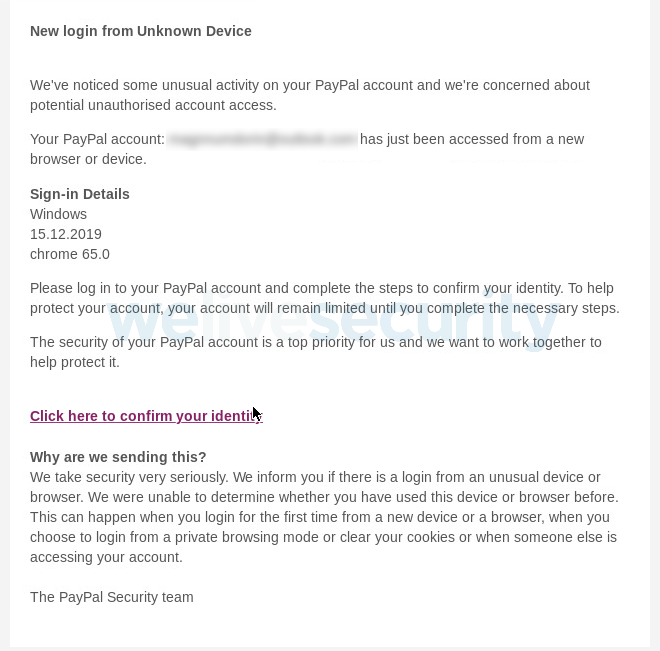Scams
The Internet can be a wonderful place. But it’s also full of fraudsters targeting people likely to commit fraud.
March 06, 2024
•
,
5 minutes. read

We all age. This is good news for digital fraudsters, who see rich prey to be won in a rapidly aging society. They are increasingly targeting older people because they suspect these targets have more money to steal, but potentially less digital savvy to spot the warning signs of a scam. In 2022, $3.1 billion in losses related to cybercrime were reported to the FBI by those over 60, following 88,262 incidents. Even if this represents an increase of 82% year-on-year, many more cases will have gone unreported.
The impact of such scams can be devastating if you are already retired and have no source of income to replace the savings lost to the fraudsters. So, if you are a senior or a concerned parent, read on.
10 scams to watch out for
The Internet can of course be a wonderful place. But it’s also full of bad people trying to steal your personal information and money. Here are some of the most common patterns:
1. Phishing
Let’s start with a threat that constitutes a scourge of the modern Internet: phishing. A phishing email or phone/social media message will arrive unsolicited. The scammer pretends to be a legitimate entity and asks you to provide information such as account logins, or click a link/open an attachment. The former could allow them to hack your accounts, while the latter could trigger a malware download designed to steal more data or lock your computer.

2. Romance scams
Romance scams won $734 billion for fraudsters in 2022, according to the FBI. Scammers will create fake profiles on dating sites, befriend lonely hearts and establish a relationship, aiming to extract as much money as possible. Typical stories are that they need money to pay for medical bills or to travel to see their loved one. Needless to say, they will always find an excuse not to join a video call or not meet in person.
3. Health Insurance/Health Care
The scammer poses as a Medicare representative in an attempt to obtain personal and medical information that can be sold to others to commit health insurance fraud. They can do this by email, over the phone, or even in person.
4. Technical support
In one of the oldest phone scams, the scammer impersonates a legitimate entity such as a technology company or telecommunications provider, informing you that there is a problem with your PC. This might happen out of the blue, or you might be asked to call a “helpline” after a harmless but worrying pop-up appears on your computer. The scammer may trick you into providing access to the machine. They will try to find a way to make money from you; for unnecessary “protection” or “upgrades” of the machine, or by stealing financial information from it.

5. Online shopping fraud
Scammers create legitimate-looking online stores and then lure users to visit them via phishing emails or unsolicited texts or social media posts. Items often come with amazing deals. However, the products are counterfeit, stolen or non-existent and the real goal is to steal your card details.
6. Robocalls
Robocalls rely on automated technology to call a large number of recipients simultaneously. A pre-recorded message can be used to offer free or discounted products. Or, it could be used to scare the recipient into responding, for example by telling them that they are facing an impending lawsuit. If you respond, the scammers will attempt to obtain your personal and financial information.
7. Government Identity Theft
Like tech support scams, these are usually carried out by call centers based in South Asia. Combined losses exceeded $1 billion in 2022. In this version, the scammer will call pretending to be from the IRS, Medicare, or another government agency to demand unpaid taxes or other payments. They will aggressively warn that non-payment could result in arrest or other sanctions.
8. Lottery scams
A scammer calls you out of the blue claiming you’ve won the lottery and all you have to do to collect your winnings is send a small processing fee or fee up front. Of course, there is no price and your money will disappear.

9. Grandparent scam
A scammer calls you unexpectedly pretending to be a loved one in danger. They usually start by saying something like, “Hey grandma, do you know who this is?” » then continue with a tale of woe designed to persuade you to part with money to help them. Usually, they ask for money transfer, gift cards or payment via cash payment app. They may ask you to keep everything secret. In some variations on this theme, the scammer poses as an arresting police officer, doctor or lawyer who attempts to help the grandchild. Advances in AI software known as deepfakes could even allow them to more accurately imitate your grandchild’s voice to perpetrate what is now called “”virtual kidnapping scams“.
10. Investment scams
This category, which brings the most revenue to cybercriminals in 2022, at over $3.3 billion, refers to get-rich-quick schemes that promise low risk and guaranteed returns, often through crypto investments -cash. In reality, the entire project is built on sand.
How to stay safe
We have I have already written about this and while fraudsters’ tactics may change, best practice advice remains fairly consistent. Remember the following to stay safe:
- If a deal is too good to be true, it usually is.
- Treat any unsolicited contact with suspicion. If you want to respond, never respond directly to a message. Instead, Google the sending institution and call or email separately to confirm.
- Stay calm, even when you are harangued on the phone. And don’t give out any personal information.
- Do not trust caller ID as it can be spoofed.
- Use multi-factor authentication on your accounts to mitigate the threat of someone stealing your credentials.
- Never send money via bank transfer, payment apps, gift cards or cryptocurrencies, as there is no way to get it back in case of fraud.
- Do not click on links or open attachments in emails/SMS/social media posts.
What to do if you have been scammed
If you think you have been scammed, contact the local police, your local bank (if financial information is involved) or even (in the US) Adult Protective Services. It’s also a good idea to reset your passwords if you’ve given them to a potential fraudster. In the United States, consider report the matter to the FTC.
If you’re reading this and have elderly loved ones you’re concerned about, take some time to discuss common scams. Technology can often be intimidating if we don’t fully understand it. But it’s this reluctance to learn more – and our reluctance to tell anyone about our scam – that scammers take advantage of. Let’s not let them have the last word.


